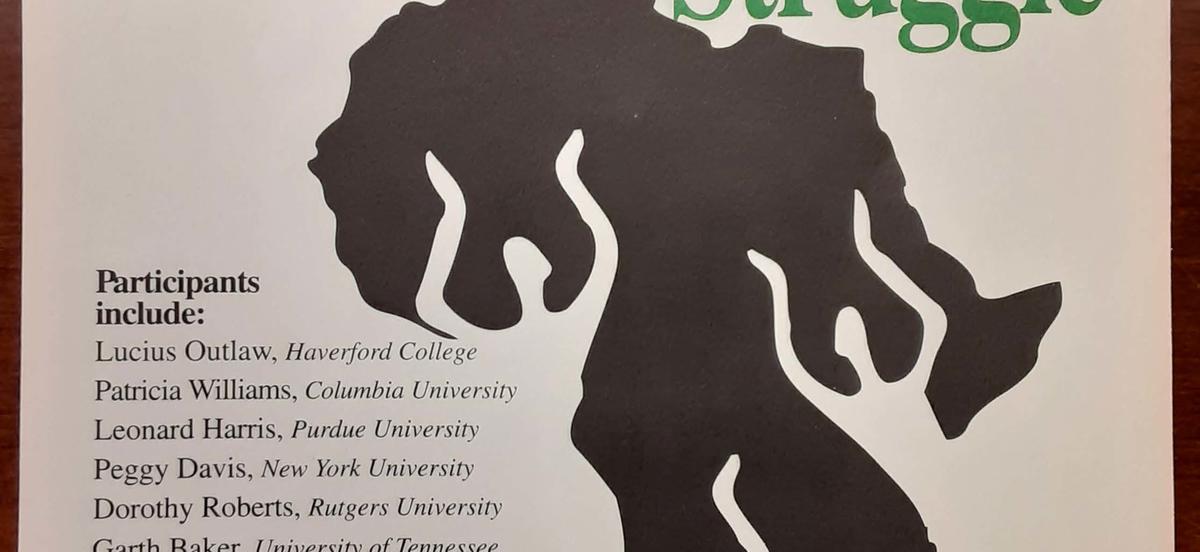Archives of Africana Philosophy

Poster for the 1995 Philosophy Born of Struggle Conference. From the Philosophy Born of Struggle Conference records.
Details
In this blog post, George Allan '24 highlights the new collections that form part of the Archives of Africana Philosophy. George works in Quaker & Special Collections as a student liaison.
Within the Haverford College Quaker & Special Collections are the records of key scholars within the field of Africana Philosophy: Richard A. Jones and Lucius T. Outlaw Jr.. Both notable academics and researchers at a number of universities throughout their careers, they have gifted the college copies of their published works and the records of their life through the scholarly work they produced. In both of these collections, Black culture and scholarship, as well as the position and reaction to Blackness in the modern world, is discussed through papers, letters, diaries, poems, and other forms of writing.
In the words of Lucius T. Outlaw Jr., one of the scholars represented in the collection, ‘Africana Philosophy’ is “a third-order, metaphilosophical, umbrella-concept used to bring organizing oversight to various efforts of philosophizing [...] engaged in by persons and peoples African and of African descent who were and are indigenous residents of continental Africa and residents of the many African Diasporas worldwide” (https://plato.stanford.edu/entries/africana/). The field is elsewhere described as a way to engage in issues of race not only in the past, but also in modernity, meaning the field of Africana philosophy is not only relevant to scholars, but also to those looking at Blackness in modern society, and how we engage with race on a day to day basis. The issues it covers and attempts to discuss are also wide in their scope, from pre-Socratic African philosophy, to the definition and place of Blackness in the modern world. Gaining traction throughout the late 20th century, Africana Philosophy has an important place not only in the modern scholarly world, but also in wider discussions on race throughout society, with many scholars using discussions within this field to define broad concepts such as Black community, the quest for equal rights, and the legacy of important Black icons.
Lucius T. Outlaw Jr., who is one of the scholars who has donated their works and records to the College, is a philosopher and academic who has taught at a number of institutions, including Haverford College, Vanderbilt University, Boston College, and Howard University, and has published a number of important works throughout his career. Perhaps his most well-known and influential work is his book On Race and Philosophy, which is a collection of essays from throughout his life. Within this book he discusses a number of topics related to Africana philosophy and Blackness in modernity, with chapter titles ranging from “Black Folk and the Struggle in ‘Philosophy’” to “Africology.” His ideas and theories play an important role in wider race discussions, and have been used by numerous authors since.
The other scholar whose scholarship and life are recorded within the Haverford Archives of Africana Philosophy is Richard A. Jones. A poet, writer, and philosopher, Jones has taught at a number of universities, including Kansas State University and Howard University, with his academic work focusing on African-American philosophy, critical race theory, and social/political philosophy. Within his collection are papers and articles on Blackness and Africana Philosophy, as well as some of his literary work, including both published and unpublished poetry and short stories. Engaging with a number of other scholars, including Lucius T. Outlaw, Jones’ writings are an important look at race theory and Africana philosophy more widely.
Aside from the works and records of specific scholars of Africana Philosophy, within the Archives of Africa Philosophy collection at Haverford there are also the Philosophy Born of Struggle Conference records. The conference is a near annual event that has its origins at Rockland Community College in New York. The conference was initially started in February 1994, as an attempt to bring an awareness of different forms of philosophy to the students and faculty of Rockland, specifically the philosophy of African American philosophers. The topic of the first gathering was “The Search for Alternatives: African American Perspectives on the Human Situation.” From these beginnings, the conference began to attract more and more people over time, with the Philosophy Born of Struggle conference acting almost as a gathering place for scholars at the forefront of the Africana philosophy movement, including people like Leonard Harris, Lucius Outlaw, Howard McGary, and many more. It was described as “an intellectual space where students and young scholars could confidently express their ideas and be encouraged in their academic careers.” In the collection located at Haverford College, the communications and organization materials of this conference can be found, from the initial posters and advertisements, to a written history of the conference, and different forms of documentation throughout the conference’s long history. Within some of the documentation is the conference’s communication with Lucius Outlaw himself, adding another layer to the connection between the various scholars represented in the Archives of Africana Philosophy.

